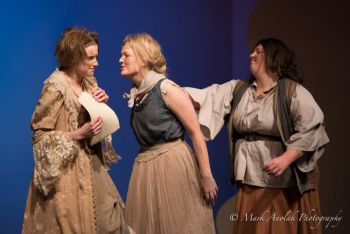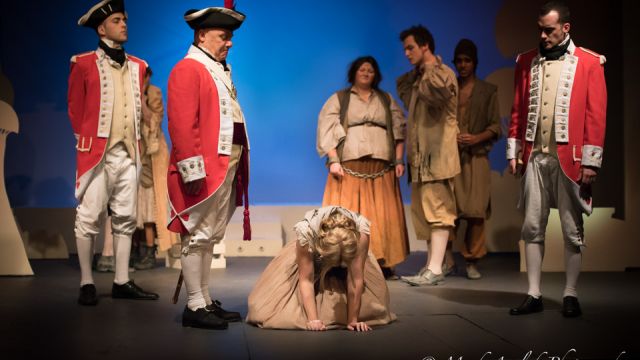Our Country’s Good
Rehabilitation or the gallows? When dealing with serious felons, it’s a question pondered by far more civilised and recent societies than that of early Australian penal colonies.
Timberlake Wertenbaker’s 1988 play Our Country’s Good is set in Governor Arthur Philip’s penal colony and poses the execution vs rehabilitation dilemma through a familiar theatrical device, a play within a play.
Under the authority of Governor Phillip and amongst harsh conditions, Lieutenant Ralph Clark is determined to produce George Farquhar’s play, The Recruiting Officer, as a means of rehabilitating some of the convicts in the colony. He faces opposition from fellow officers, a potential hanging of the play’s ‘leading lady’ and rehearsal interruptions while some of the ‘actors’ are flogged. He must also factor in the convicts’ own issues, including illiteracy.
 Directed by John Graham, there are strengths in The Stirling Players’ production, particularly in the technical aspects, but it misses the mark somewhat, partly because of uneven characterisations.
Directed by John Graham, there are strengths in The Stirling Players’ production, particularly in the technical aspects, but it misses the mark somewhat, partly because of uneven characterisations.
This is a very, very difficult play. It’s one that requires the complete ensemble to be experienced actors and yes, in this production there are excellent performances, serving to demonstrate the potential of the piece. However, some actors struggle to meld the complexities of the absurd comedy inherent in the play with the tragedy of desperate souls thrown together far from home; convict and military man alike. Because of this, the audience is left somewhat underwhelmed.
Lee Cook is very good as Lieutenant Ralph Clark, portraying him as an earnest young man, never judgemental and full of complete conviction that theatre can be transforming. Cook’s diction is excellent.
Several actors play more than one character. Dave Simms is superb in his two roles, as Major Robbie Ross and as hangman Ketch Freeman, switching from Scottish to Irish accent seamlessly. His Robbie Ross is bombastic and cruel, while Ketch Freeman is also beautifully played, with Simms skilfully highlighting the likeability of this gentle, insecure man, a fact that belies the character’s executioner position in the colony.

Among the other officers there are particularly good characterisations from Tim Williams as Captain David Collins and Patrick Marlin as the twitchy Captain Jemmy Campbell. Disappointingly, Peter Collins is rather stiff as Captain Arthur Phillip.
A strangely watchable Nathan Brown picks up on the comedic qualities of the play and gives an insightful and hilariously bizarre performance in one of his two roles, that of convict Robert Sideway. He plays the ham and steals the limelight in both this play and the one his convict character is rehearsing.
Jean Collins and Ellie McPhee do well as Mary Brenham and Dabby Bryant respectively, as does Kate van der Horst as Duckling Smith. Jakob Maddocks is believable as the convict John Wisehammer.
David Greig has quite good moments as Midshipman Harry Brewer but needs to inject more light and shade in his characterisation, particularly in his final anguish. Katherine Silbereisen also needs to include a little more variation in her portrayal of the tough, aggressive convict, Liz Morden, with less rushing of lines.
Diction is an issue for a few actors in this production. On opening night I had difficulty understanding some dialogue…and it wasn’t due to the inclusions of period slang in the script.

Denis Peach’s set design is excellent, complemented by fine lighting design by Sally Putnam and the very good sound design created by Ian Johnson and Paul Tossell. Costumes are wonderful.
Pace was slow in the first act on opening night, but picked up in the second half of the play.
The Stirling Players have been very brave in choosing this play. It requires nuanced performance, just the right fine balance of intense tragedy and black comedy, together with a lot of concentrated effort by the audience to absorb all of this and be satisfied with the result.
Playwright Wertenbaker recognises how complex her intelligent play is, even wryly commenting through one character, ‘People who don’t pay attention shouldn’t come to the theatre.’
I paid attention, but unfortunately didn’t quite see what I’d hoped for.
Lesley Reed
Subscribe to our E-Newsletter, buy our latest print edition or find a Performing Arts book at Book Nook.

